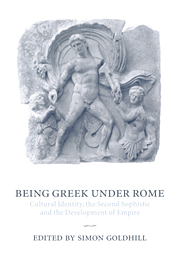Book contents
- Frontmatter
- Contents
- List of contributors
- Introduction: Setting an agenda: ‘Everything is Greece to the wise’
- 1 Subjected to Empire
- II Intellectuals on the margins
- III Topography and the performance of culture
- 7 ‘Greece is the World’: exile and identity in the Second Sophistic
- 8 Local heroes: athletics, festivals and elite self-fashioning in the Roman East
- 9 The Rabbi in Aphrodite's bath: Palestinian society and Jewish identity in the High Roman Empire
- List of works cited
- Index of major passages discussed
- General index
8 - Local heroes: athletics, festivals and elite self-fashioning in the Roman East
Published online by Cambridge University Press: 22 January 2010
- Frontmatter
- Contents
- List of contributors
- Introduction: Setting an agenda: ‘Everything is Greece to the wise’
- 1 Subjected to Empire
- II Intellectuals on the margins
- III Topography and the performance of culture
- 7 ‘Greece is the World’: exile and identity in the Second Sophistic
- 8 Local heroes: athletics, festivals and elite self-fashioning in the Roman East
- 9 The Rabbi in Aphrodite's bath: Palestinian society and Jewish identity in the High Roman Empire
- List of works cited
- Index of major passages discussed
- General index
Summary
Introduction
A rather unremarkable statue base was set up some time under the reign of Gordian III in the entrance-passage of the agora of the Lycian city of Oinoanda.
(a) (on mouldings:) (statue) of Poplios Sthenios Fronto, son of Likinnianos, by gift.
(b) (on the shaft) When Ioulios Loukios Peilios Euarestos was the agonothete of the fifth panegyris […] Euaresteia which he himself founded with his own money, Poplios Sthenios Fronto, citizen of Oinoanda, son of Poplios Sthenios Likinnianos having been crowned in the men's pankration; open to all Lycians.
(c) (epigram) First my Fatherland crowned me for the boys' wrestling and honoured me with a glorious statue in bronze; later, having carried off for my fatherland the men's pankration …
The honorand was a member of a prominent local family, who had excelled as a heavy athlete all his life, and the base must have carried a statue of Fronto as a victorious athlete. It is obvious from this text that athletic victory was a crucial aspect in Fronto's self-image. But texts such as these suggest that there was more at stake than simple personal pride in athletic excellence: Fronto presents both his athletic victory, and the commemoration of this victory as his gifts to his fatherland. Success in an agonistic festival apparently had a social importance that went well beyond the interest of the individuals concerned.
- Type
- Chapter
- Information
- Being Greek under RomeCultural Identity, the Second Sophistic and the Development of Empire, pp. 306 - 334Publisher: Cambridge University PressPrint publication year: 2001
- 46
- Cited by

